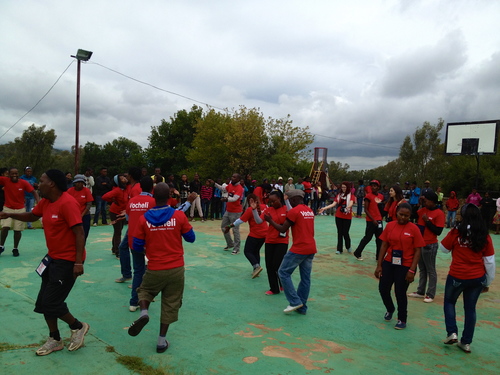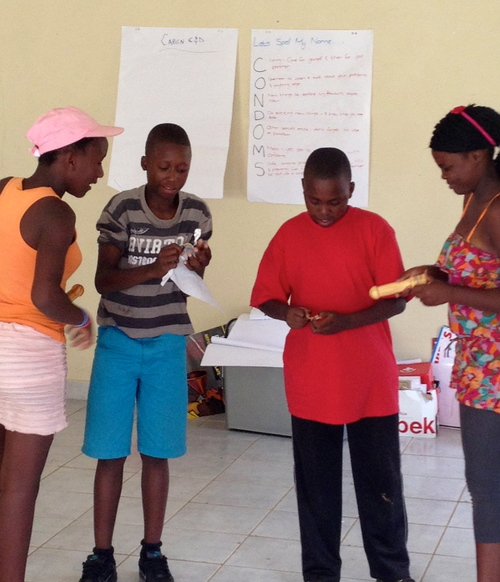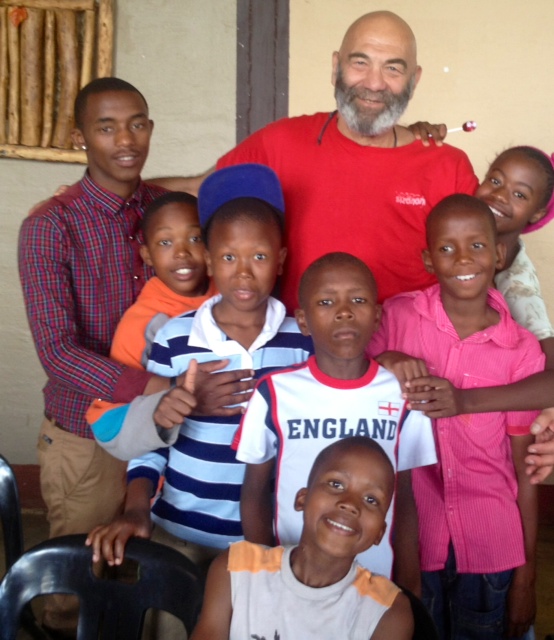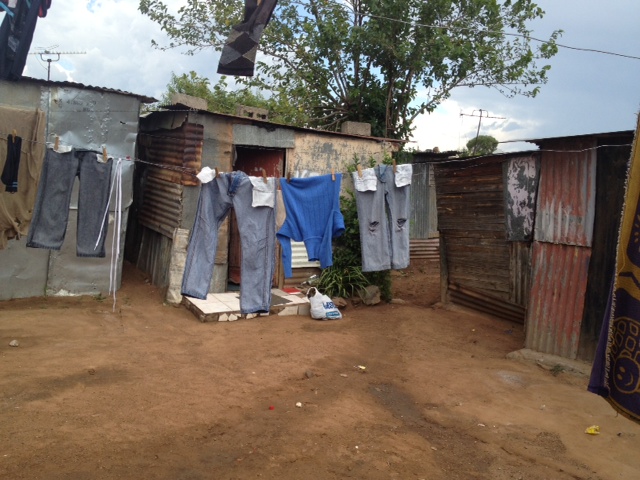HIV and AIDS are immensely prominent concerns
in South Africa and at Camp Sizanani. In
some ways they are the central
concern. I’ve tried to find a comparable
issue in American life, something that is so much a focus and concern of
everyday life, but the closest I came to it was money, and in too many ways
that analogy fails. But at the risk of
trying too hard to make my point, HIV is to South Africa, what balls and
strikes are to baseball, you can’t play the game of life or baseball without
being intensely aware of them. And the
social, financial, and sexual consequences of the epidemic are nothing less
than overwhelming, evoking in South Africans a sense of the need for an almost
puritanical, clinically “safe,” sexual morality that focuses on abstinence,
testing, and disease prevention in the face of statistics that suggest over
forty percent of all South Africans under the age of fifteen are HIV positive
and that more than half of those HIV positive youth will die before reaching
the age of thirty.
There are six international volunteers among
the two to three dozen counselors/vochelli on the bus going to Camp Sizanani for
five days of training before the one hundred and fifty campers arrive. One volunteer, a dentist from New Jersey,
was a bunkmate of Phil Lilienthal, the camp director, sixty years ago in Maine. I was Phil’s high school classmate. Other than these six all the other counselors
are young Africans mostly from the township of Soweto, which is where all of the
campers are drawn from. Many vochelli have
been campers at Sizanani themselves. The
energy on the bus is electric, with men and women standing in the aisle,
chanting, singing, dancing, and laughing.
Everyone knows the words to all the songs and the moves that accompany
them. Some have a call and response
quality. Everyone is laughing,
hard. This energy and behavior,
interspersed with good-natured ribbing and teasing, basically continues
unabated for the entire ninety-minute ride to camp, for the five days of
vochelli training, and for the full eight days the campers are with us.
A few of the vochelli sit down next to me during
the ride to introduce themselves. Most
are Zulu, although there are also Xhosa, Sotho, and Tswana among them. Each has a given birth name that means
something, like “education,” or “daybreak.”
My favorite belongs to a Zulu man named Bongani, which means gratitude. All of the Black Africans are able to speak
and move competently and familiarity between two and often three
languages. At one point one of the
leaders in addressing the group uses the word “quickliest” to describe
something, and instantly realizes he has made up a word, which causes him and
the others to laugh. “It is the
quickliest,” he repeats out loud a few times with great pleasure. “Quickliest. Quickliest,” repeats the group laughing. Over the course of our days together
quickliest breeds niceliest, firstliest, and a whole genera of words like
happiliest, a modification to English adjective use long overdue.
I am reminded in this specific regard of a
conversation I overheard in the bathroom at the Backpackers’ Ritz right before
leaving for Camp. Two young African
women were showering in adjacent stalls and conversing, switching back and fort
between Zulu and English, unaware of my presence, when one said to the other,
“But why is it that we can comfortably speak their language and they cannot
speak one word of ours?” It is a
question worthy of consideration in a country where the stanzas of the national
anthem are sung in four different languages successively: Zulu, Sotho,
Afrikaans, and English.
Camp is held at a beautiful retreat center abutting
a game reserve with zebra, giraffes, and antelopes, about an hour and a half
out of Soweto. On arrival each vochelli
is assigned a bunk where we drop off our packs and then reconnect for a day of
very intense team building, high ropes obstacle courses, and games that can’t
be won. I am cautiously physically
engaged, fully emotionally engaged, and profoundly aware of my old man’s lack
of strength, flexibility, and quickliness.
Camp is so different than the ashram I studied at for a month in India
more or less a year ago – the ashram being about spiritual engagement and the
seeking of one’s highest level of awareness by a combination of active physical
practices (asana), breath practices (pranayama), and the mindful disintegration
of attachment and the notion of self - while camp is in its very essence about self-awareness,
increasing self confidence, and encountering one’s discomfort zone, with a
bottom line focus on having fun in the moment, self-empowerment, and preventing
the spread of HIV and AIDS. The work here
is not about reaching enlightenment and minimizing the self, it’s about survival
and reaching thirty.
Another contrast
is that at the ashram, aside from instruction in asana and yogic practice we
were fed vegetarian meals fit for a king: endless freshly baked chapattis,
yogurt, vegetables, fresh fruits, beans, marvelously spiced stews and other
dishes. Here I regret to say, from an
American’s perspective, public school lunch meals and prison food would be far
more nutritious than what we are served, lunch usually being some ghastly
processed meat on a roll, a small lettuce salad, bug juice, and as much bread,
margarine, and jam as one could care to eat, dinner a meager portion of boney meat
or chicken in a vegetable free sauce with some white rice or ground maize, bug
juice, and as much bread, margarine, and jam as you’d like, and breakfast being
tea or water flavored with a minimum amount of instant coffee, half a small
bowl of cornflakes and milk, one hard boiled egg (on a good day), no bug juice,
and as much bread, margarine, and jam as you’d like. There is an emphasis at the camp on teaching
nutrition. I can’t wait to see it … or a
piece of fruit. Still, the energy is
very positive, egos seem to have been checked at the door, and a sense of
mission and service to others most characterizes what the camp is about and why
people are here. Besides, as a practical
matter, on a comparative basis this is fare that far exceeds what the campers
and the vochelli get at home.
Also introduced at meal times are a variety of
unusual conventions, all designed I suppose to help break down barriers and that
will be part of the fare once the campers arrive. Of particular note is a “utensils free” meal
eaten with the fingers, a “hands free” meal eaten by burying your face dog-like
in the plate (very messy), and a meal where everyone feeds the person on their
left and is fed by the person on their right.
The training goes on nearly twelve hours a
day. All alcohol, tobacco, sexual
relations and cell phone use is forbidden.
The focus is on establishing and maintaining caring adult relationships
with vulnerable children, about mentoring, encouraging success, and offering
value judgment free information about HIV/ AIDS, teen pregnancy, condom use,
drug and alcohol use, peer pressure, and physical abuse. The expectation is that a mere week here can
and will change the lives of some of the youth who attend camp, especially
those who follow up with “Youth Club” membership after they return to Soweto. The Camp’s data suggests this is true.
In one exercise we are asked to write about a
hero and what made that person heroic to us.
My sister Sheryl and I independently name Alan Berkman; there is a
smattering of Oprah, Nelson Mandela, Barak Obama, and inspiring teachers. But far more than half of the counselors name
their mother as their hero, a function I suspect of their youth, but also
something about mothers, mostly single mothers, in a the challenging context of
Soweto, and how the South African mothers provided for, encouraged, loved, fed,
and kept their families together.
And throughout it all the harmonic, rhythmic,
and compelling singing and dancing of the vochelli, something that literally
lifts spirits and energy and feeds upon itself, one song ending and another
beginning merely upon the call of a new song leader. This, and the range of artistic skill,
emotion, humor, and raw talent on display at the vochelli talent show is also
amazing, including a one man skit depicting the forces that shaped the nineteen
year old protagonist’s brother’s murderous path that left people in the
audience crying.
The five day long vochelli training program concludes
with the assignment to camper cabins and daily activity groups before the
campers arrive. I am assigned to
something called Life Skills, an immensely ambitious attempt in eight days to
introduce the campers to the notion of exposing their lack of accurate
information, their fears, and their pains, as well as impressing upon them what
resources are available outside of the camp experience that can support and
help them as they struggle with issues of drug and alcohol abuse, teen
pregnancy and HIV/AIDS. The core of the
LS experience is about sympathetic listening, resource sharing, and guidance,
far more than it is about problem solving.
Other daily activities include swimming for 150
non-swimmers, sports and adventure including the obstacle course, theater and
dance, nutrition, mental IQ/chess with a ranked U.S. master who has taught kids
for years, arts and crafts, three meals a day, cabin time, and one or another
post-dinner activity, such as skits, talent shows, and campfires.
During the last training exercise each vochelli
is asked, as campers will be asked, to say what people see when looking at what
is “written on the front of their” shirts and what is not seen on the back of
their shirt. A majority describes the
positive energy and happy face they present to the public on the front of their
shirts and the sadness, hurt, frustration, and pain that they wear inside on
the back. Sheryl, reveals she is mourning
the death of her son on the back of her shirt.
There is a fair amount of crying.
And then, as a finale, each person stands one at a time in the center of
the circle while their peers call out all the positive characteristics they see
and ascribe to that person. It was
actually quite powerful to hear the rolling volley of warm, friendly, positive adjectives
sailing through the air. The unique
characteristic I hear ascribed to Sheryl is “motherly,” a testament to the
reality of her status and to what she so lovingly manifests. And I was quite pleased to hear “wise” and
“role model” ascribed to me, although I could have done without the truthful and
equally accurate “old man.”
When the campers finally arrive for their
eight-day immersion it is fascinating to witness the way they are drawn in and
encompassed by the vochelli from the very minute they step off the busses and
are greeted by singing, dancing counselors, assigned to groups, and brought
quickly to a hands free hot dog lunch.
And the entire first day is basically spent dancing and singing, which
breaks down inhibitions and barriers for kids who don’t know one another with
amazing grace and speed. And dance and
sing they do, walking from activity to activity, waiting for dinner, before
clearing tables, and around the campfire.
And that is basically Sizanani; seven
structured activities a day - swimming, sports and adventure, theater,
nutrition, mental IQ, arts and crafts, and Life Skills - interspersed with
meals, cabin time, and an immense amount of singing and dancing. What is clear from the start, however, is
that the recreational activities like swimming, sports, and arts and crafts,
are the contextual entities that surround and support the real core of the
Sizanani program, which is the increasing of self-awareness and self confidence,
as well as the dissemination of an immense amount of information, particularly
about HIV.
In Life Skills the five vochelli assigned to
that program meet with five separate groups of boys and girls divided by cabins
and age and their cabin counselors once each day for an hour. We sit in a circle. It is very personal, and intensely
intimate. One day there is a discussion
about evolving bodies. Tampons and
absorbent pads are displayed. Myths and
facts about menses and pregnancy are explored.
Everyone handles a tampon.
Naturally the specifics are very different when presented to eleven year
olds, as opposed to when presented to eighteen year olds, but there is much to
learn and share in each group.
Another day is spent on the question of peer
pressure, what it looks and feels like, how it has been experienced by the
campers, what its connection is to drug and alcohol use/abuse, bullying, and
having the strength to say “No.” Even
the distinction between good and bad peer pressure is explored with examples
drawn from the campers’ real lives. The
eagerness and willingness of the campers to participate and share their
experiences is impressive, even passionate, and held at a high level of
cognition, with more than one camper addressing the differences, for example,
between arrogance and self-confidence. And
so much of what goes on is not “teaching” per se, or “processing” per se, but a
wonderfully organic blend of the two.
Another day is spent talking about safe sex,
HIV and AIDS. There is a graphic display
on the use of condoms with real condoms, wooden model penises and plastic
vaginas that the students handle and practice on, as well as a display of
female condoms that has both eleven year olds and eighteen year olds
gasping. Books with graphic pictures of
STDs in their most severe manifestations are shared. There is an immense emphasis on abstinence,
testing, and fidelity. Not insignificant
in these presentations is a significant amount of nation building talk and the
responsibilities this generation of freedom-born young men and women have for
the future well being of all South Africa.
And I particularly like how vochelli routinely ask the campers if they
would like to try to answer other campers’ questions, before answering
questions themselves.
Another fascinating day at Life Skills is spent
on the question “Who I am,” where I am again amazed by the commitment of the
campers to participate, to actually writing out their answers, to describing
their journeys of “self-discovery,” to talking about teen pregnancy, to
referencing teens they know who are pregnant, to talk about coercion, abortion,
and rape. One statistic of note here is
that fifteen percent of rape survivors in South Africa are reported to be under
age twelve, and over forty percent of rape survivors are under age
eighteen. I am impressed by the number
of campers willing to share that they are short-tempered and angry, as well as
smart, talented, loving, playful, and African, a very important part of their identity.
The penultimate
day of Life Skills, before the wrap up session on the last full day before the campers
return home and the vochelli debrief, is something called the “Journey of Life,”
where grief, sorrow, pain, and anger are so openly shared and prominent that it
is a bit hard to separate myself from the very strong emotions I am witness to
and those that I share. The comparison
to some form of group psychotherapy experience is not unwarranted and many of
the concerns a Western trained and oriented clinician might have, particularly
about opening emotional doors without the real possibility of meaningful
follow-up are on my mind, and is a concern/awareness shared by the counselors. Still the day is seen as a peak moment of the
Sizanani experience.
So
picture a room filled with thirty eleven year old or eighteen year old boys and
girls all of whom are being encouraged to openly reveal the most painful
aspects of their lives, the things people who look at them cannot see because
they are written on the backs of their T shirts, and they do: abusive parents,
fathers who have killed their mothers, mothers they’ve never met, constantly
bickering parents, drunk mothers, relentless criticism at home and in school,
the pressure to offer sexual favors for money, homelessness, hunger, rage,
fear. The tears flow freely and
copiously. The vochelli and other campers
are physically comforting, but the pain is raw and real, and although the
notion of “letting the pain and shame out” as an act of healing and catharsis is
repeated frequently there is also an overwhelming aura of pain suspended in
air, of homes, families, and communities that will have to be returned to, of
the real scarcity of counseling resources available and the limited
opportunities for continuity and follow up.
What
I find most interesting in ways is that the vochelli tell the children that they
love them unconditionally, that they loved them before they met them, that they
will always love them. This level of
lovingness actually seems real to me, as much as it is somewhat unimaginable. And when the kids wrap up on the last full
day although there is a fair amount of critical candor, particularly about the
behaviors of certain vochelli, and the size of the food portions, there is also
no shortage of genuine and intense appreciation for the overall experience as
these beautiful, touching, vulnerable young people share what they have learned
and gained: “to face my fears,” “how to put my face in the water and breathe,” “what
good nutrition is,” “more brothers and sisters,” “how to use a female condom,” “how
to better express myself,” “teamwork,” “trust,”
“where I can find help,” “more about HIV,” “to feel safe saying things I
never said before,” “to call things by their true names,” “what peer pressure
is and how to say no,” “to say ‘I’ and not ‘we,’ ” “to treat women with more
respect,” “how to interact more openly with guys,” and on and on. One even says he loved me because I was like a
father to him. What more can a man on
walkabout ask for?
At the final night’s campfire, after a lovely slide
show and very heartfelt hugs and goodbyes, Phil tells the campers that it cost
about 2500 Rand (300$ American) to bring each of them to camp, and that the
only thing Sizanani asks of them is that they “play it forward.” For those readers inclined to offer their
contribution to playing it forward I ask that you visit the Camp Sizanani or
Global Camps Africa website and find the donation page. The future of an entire generation of African
depends on it.
In concluding these
observations about this phase of my Africa journey, I must emphasize that the
shanty towns of Soweto from which the vochelli and campers come are as poor as
any village I every saw in India, and when at the end of camp we are invited to
visit the camp director’s home – a squatter’s shack in the Kliptown section of
Soweto – it had no electricity, no running water, outdoor potty toilets, a
neighborhood water fountain, barefoot children running in muddy lanes, and a
leaky roof on an earthen floor.
And lastly I must acknowledge that I am not at heart a big
devotee of camp life, and much as I truly enjoyed the energy of Sizanani, and
the incredible display of dance, song, and theater talent displayed by all, and
am grateful to have been welcomed as witness to and participant in the lives of
the campers and counselors, and to sharing so openly in the lives of over 200
young South Africans, I also was subject to far more structure than I
personally favor – 8 A.M. breakfast, 9, 10, and 11 o’clock life skill sessions,
lunch, planning session, two more life skills sessions, dinner, etc., and I was
only able to sneak away for a few hours one morning when I took a magnificent
walk alone up into the hills beyond camp, following a dirt road and the tracks
of springbok, catching a glimpse of a grazing giraffe and zebras, seeing butterflies
in colors and patterns I’d never before seen, and being ridiculously happy
alone in space and time, hearing the call and response of birds, witness to the
flight of seeds and the flow of clouds and seasons. Besides, speaking as any good spirit being and
guide might, it is important to know when it is time to move on, and that time is
now. And beyond all that, my friends, what
I really want is a cold beer, maybe two.
Next stop the Hyde Park mall.
Tomorrow Dar es Salaam.




